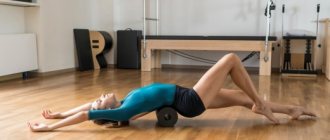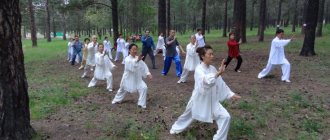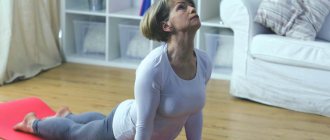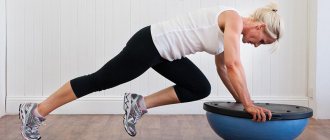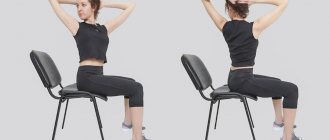How to choose the right exercise system?
In many ways, the choice of technique depends on contraindications for health reasons and the presence of chronic diseases. If there is a long-term illness, low energy and excess weight, exercises are used in a sitting or lying position. For weakened people, static exercises are recommended, and if there are no contraindications, a dynamic complex can be used. If there are no obvious violations, you can proceed to the standard course in a group.
The area of the body on which you decide to focus is also taken into account. If a student suffers from low blood pressure, it is advisable to focus on the upper body. As a result of regular exercise, blood pressure can normalize. If a person suffers from high blood pressure, it is advisable to focus on the arches of the feet.
For people who spend most of their working time in intellectual work and lead a sedentary lifestyle, it is advisable to pay attention to the lower limbs. You can focus on the middle area for cycle disorders in women.
https://shiyanbin.ru/qigong_in_moscow/ qigong classes are divided into the following areas:
- Ba Duan Jing. The technique is also called “eight magnificent movements.” The complex is based on a smooth transition from one pose to another. There is an alternation of muscle relaxation and tension.
- Liu Ji Jie. The practice literally translates as “The Art of Creating Six Healing Sounds.” The popular breathing practice is known for making characteristic sounds as you exhale.
- Wu Qin Xi. Also called "Five Animal Games". The exercises are aimed at simulating the actions of a crane, deer, monkey, bear, and tiger.
- And Jing Jing. The literal translation is “classical gymnastics for muscles and tendons.” The complex is aimed at developing flexibility and strength, includes tension in joints and muscles, body turns, twisting and bending.
After solving existing problems, it is advisable to move on to other parts of the body and change practice. You should not rely on another person’s set of exercises, as the load may be excessive or ineffective.
How to practice so that qigong for the elderly brings maximum benefits
The effectiveness of qigong training for older people can be increased by following these tips:
- The ideal time for training is the morning. You need to start exercising immediately after waking up and getting up, after doing a simple warm-up;
- It is recommended to eat 30 minutes after finishing your workout;
- You should not do the exercises in jerks. Achieve smoothness and be sure to monitor your breathing;
- While performing the exercises, lightly press your tongue against the upper palate;
- The eyes should be half-closed;
- Clothes should not restrict movement, so avoid tight-fitting outfits and give preference to a loose-fitting suit;
- It is best to perform exercises in a well-ventilated area or in the fresh air;
- Watch your sweating. Increased sweating may indicate excessive exertion, so it is necessary to change wet clothes and reduce the pace;
- Avoid hypothermia;
- After finishing the workout, a warm, relaxing shower is indicated;
- To achieve maximum results, it is necessary to perform qigong training for the elderly daily.
How to master methods of concentration, translation and switching the focus of attention?
Practicing qigong will not work without a meaningful approach. The practice involves immersion in complete tranquility. This is a kind of rest for the cerebral cortex. But it is important to learn how to perform each exercise correctly.
The basic rule for completing a set of qigong exercises is “Immersion in a state of rest.” It is advisable not to combine different entry methods. For this purpose, a system of entering and exiting the state, direct repetition of the setting, control of the breathing rhythm, and counting to oneself are used. The result is to disconnect from external irritating factors and remove negative effects on the cerebral cortex.
To understand the technique of concentration, you need to follow simple rules:
- the student must strive for a state where “something seems and seems to be missing”;
- concentration seems to be there and at the same time it is not there;
- it is not brute force that is used, but thought;
- concentration should not be excessive and cause severe tension;
- no conscious or rational concentration is allowed;
- one should not do without mental action.
Methods of concentration differ depending on the predominant disease. Those with low blood pressure focus on the upper part of the body, while those with high blood pressure focus on the lower part. It is also possible to be distracted by shades. If you have lung diseases, be distracted by white shades, if you have liver diseases - by green tones, if you have problems in the stomach or spleen - yellow tones, and if you have problems with the kidneys - violet tones.
If it is difficult to concentrate, it is better to first shift your attention to an external object. Switching focus works like this: you need to select an object and stabilize it, focus on it, disconnect from it and switch focus to the dantian area. Over time, a serene state can be achieved, enhanced by true chi energy. As a result, health gradually improves and inner strength increases.
What are the benefits of qigong for older people?
Often, accelerated aging occurs due to decreased physical activity. Many people over 40 years old experience muscle hypotonicity due to a sedentary lifestyle and excess weight. Spending a significant amount of time in static sitting positions, many people ignore the need for minimal physical activity to normalize the activity of the muscular system. However, scientific research confirms the fact that even half an hour of daily walking can increase average life expectancy. An active lifestyle helps not only to delay old age, but also to avoid numerous diseases associated with it, as well as restore one’s health after those already suffered.
Qigong can be a way to keep fit without heavy physical activity and exhausting workouts. Mastering the entire set of qigong exercises for older people will not be difficult. All classes are held at a smooth pace with mandatory monitoring of breathing and the general condition of the body. During training, coordination of qi energy flows occurs, penetrating all systems of the body and creating a balance of the physical, spiritual and energy bodies. Exercises performed while sitting, standing or lying down help restore psychological balance and achieve relaxation.
During qigong classes for the elderly, you can achieve the following results:
- Relaxation and breathing control;
- Strengthening immunity;
- Improving coordination of movements and orientation in space;
- Increased muscle tone;
- Training of the cardiovascular and respiratory systems;
- Maintaining the functioning of the musculoskeletal and vestibular systems;
- Improving the functions of the central nervous system;
- Stimulation of metabolic processes;
- Maintaining general body tone;
- Formation of a positive attitude.
By practicing qigong along with a healthy lifestyle and proper nutrition, older people can achieve not only healing effects, but also improve the quality of their lives. Good health and excellent mood will be a pleasant result after the training.
When is the best time to practice qigong?
In accordance with the practice of traditional Chinese medicine, the flows of qi and blood circulate (circulate) through special energy channels - a system of meridians and collaterals. During daylight hours, a closed circulation cycle occurs in the human body along 12 meridians. Every 2 hours, a certain meridian dominates, and the opposite meridian retreats as much as possible in its action.
The optimal time for classes is from 3 to 5 am. Previously, doctors in the Middle Kingdom believed that the correct qi energy was concentrated in the lungs. Ancient works indicate that this organ is not only the place where true energy is generated, but also keeps the entire body in balance. This time period is the period of the birth of yang power. This period is excellent for therapeutic and preventive measures.
You can also set aside time around 12 noon, when training will be fruitful due to maximum Yang. You can also highlight the time at 12 o'clock at night, when maximum Yin is characteristic.
Often today they train in the morning before work. 30-40 minutes is enough for quality training and a surge of energy for the whole day. It happens that evening workouts are preferable. In this case, classes are postponed until after the end of the working day.
Qigong exercises for older people with kidney and genitourinary diseases
These exercises help strengthen the muscles of the perineum, thereby improving the free flow of blood and tissue nutrition in this area. The risk of developing urinary incontinence and the formation of hemorrhoids is reduced.
So, let's look at the four main exercises of this technique:
1. Lying on your back.
Starting position – back tightly pressed to the floor, head on a slight elevation, arms extended along the body.
Stimulate the roof of your mouth with your tongue to release saliva. Once this happens, take a slow, deep breath in through your nose and imagine a flow of chi energy moving towards the perineum, while simultaneously tensing the muscles in this area. Clench your teeth, clench your palms into fists, extend your toes as far as possible and hold your breath for 5 seconds. Exhale slowly and relax.
These steps should be repeated for 5-10 minutes. To achieve the best results, this qigong exercise for the elderly is recommended to be performed in the morning, afternoon and evening every day.
2. Slow walking.
Imagine that you are on a walk in your favorite park, walking slowly along the park path. Focus on your slow steps without thinking about anything else. Lick your upper jaw with your tongue. Allow your arms to move along your body in a relaxed manner, clasping your palms lightly into a soft fist. Squeeze your toes slightly, imagining that you are trying to pick up a handful of earth with them. Take slow, smooth steps while rhythmically tensing the muscles of the perineum.
Move at this pace for 3-5 minutes, then relax your whole body and walk slowly for 1-2 minutes. Repeat the algorithm again. Do this qigong exercise for the elderly for half an hour in the morning after sleep and in the evening before going to bed.
3. Standing still.
Starting position – feet shoulder-width apart, knees slightly bent, toes tucked. Without tilting your upper body, lower yourself into a quarter squat. Tuck your chin to your chest, maintaining a straight posture, arms down along the body, palms closed in a partial fist, gaze downward.
Move your tongue in your mouth to encourage salivation. After swallowing saliva, take a deep breath through your nose and tense your perineal muscles. Imagine that the chi energy slowly moves through the body from the tailbone up the spine and penetrates through the crown and under the tongue. Exhale slowly and relax the muscles of the perineum. Repeat the algorithm 20 times, then close your palms, placing your right on top of your left, and press with both hands on the tan tien point, which is located in the perineum area. Focus on this area and take 3,050 leisurely steps.
This qigong exercise for the elderly is recommended to be performed in the morning and evening every day.
4. seat.
This qigong exercise for older people is performed similarly to the previous one, only it needs to be done while sitting on a stable chair. In between approaches, you need to take 30-50 slow steps. To achieve results, it must be performed morning and evening every day. If you are confident in your abilities, try adding daytime.
Why is it necessary during qigong training?
For successful exercises, you first need to become familiar with belly breathing. It is necessary to perform thin, long, even and smooth inhalations and exhalations. Don't use chest breathing. Deep and diaphragmatic breathing from the belly will do. Qigong masters consider the main task of training to be training qi dantian. This type of breathing is associated with strengthening the body. development with proper breathing practice.
It is advisable not to start doing active exercises initially, but to learn breathing techniques. Energy enters the body through the nose, descends into the stomach, and flows throughout the body.
Tai chi (taijiquan)
Chinese ancient gymnastics tai chi is aimed at reducing excess weight and increasing longevity. All lessons merge into a smooth dance, which improves coordination and burns a lot of calories. In addition, it is ideal for older people for whom sudden and strenuous movements are contraindicated.
All movements should come from the lungs. Slow and smooth breathing should flow into the same leisurely movements. It’s better to close your eyes during the first lessons, visualizing everything in your head. This helps you get rid of depressing thoughts and relax. Once done, your mind is clear and calm, a great start to every morning.
Why do I sometimes experience a feeling of tongue root, dry mouth and dry lips during qigong practice?
In some cases, during exercise there is a feeling of dryness in the mouth and lips, and a feeling of hardening of the tongue. During classes, you need to monitor the position of your tongue. It should be relaxed, and the tip lightly touches the palate behind the alveoli located above the teeth.
It is important to act lightly and naturally. If there is a feeling of hardening of the tongue, the procedure is broken. Also, the conditions may be met, but with excessive or unnatural effort. Such deviations can be corrected, but you must strictly follow the requirements of practice. If such conditions appear constantly, it is better to suspend the practice and do everything correctly.
What should you do if you sweat profusely while doing exercises?
If a student sweats a little during class, this condition is normal. If sweating becomes excessive, this condition can lead to collapse.
The following processes lead to this result:
- improper, intense breathing with excessive activation of the circulation of qi energy;
- increased concentration;
- excessive physical stress.
As a result, the sweat glands begin to work actively. To prevent this from happening, it is advisable to interrupt the workout, relax a little and calm down. Only after this can you continue training.
Features of qigong gymnastics for the elderly
When practicing qigong for older people, you must adhere to some recommendations:
- Qigong will not help you “pump up” your muscles and gain a sculpted figure. In older people, collagen production is reduced, so increased stress on weakened muscles, ligaments and joints can lead to their damage. This is why it is so important to find the right balance and perform the exercises without excessive effort;
- It is necessary to gradually increase the load. Since regular exercise helps strengthen muscles, further training without taking into account adaptation will not help achieve the desired healing effect;
- Exercises should be comprehensive, working all areas of the body;
- It is necessary to follow the recommendations of an experienced qigong practitioner for the elderly and a mentor who will help you perform the exercises correctly and control your breathing.
What is contraindicated and what should you pay attention to during qigong training?
There are the following contraindications to training:
- serious lesions in the musculoskeletal system;
- general serious condition;
- blood diseases;
- tachycardia or heart defects;
- serious mental disorders;
- traumatic brain injury;
- spinal lesions.
The greatest harm is observed during classes in the case of independent study without the guidance of an experienced instructor or master. It is especially dangerous to train if you do not have experience working with a specialist.
Experienced qigong practitioners recommend postponing classes if chronic diseases worsen, if you are taking a large amount of medications, if you are very tired, or if you overeat. After eliminating these factors, you can return to exercise.
The main reason is the individual approach of the master, taking into account the state of each teaching. In good centers, the teacher works with students individually or gathers small groups. If you act on your own, you may miscalculate the load or make excessive efforts.
To rule out possible problems, you should consult with your doctor. This is especially important in the presence of chronic diseases. It is also worth familiarizing yourself with the list of contraindications for playing sports. Next, you need to identify the disease limitations of a particular specialist, since practice may differ depending on the choice of specialist.
Master Shi Yanbing's school conducts testing and interviews before admission to the course. As a result, groups are formed in which health and general well-being are taken into account. This takes into account physical development.
How to start practicing
You can practice qigong with an instructor or start on your own, taking information from videos and books. We will look at both methods.
How to find a good teacher
By choosing a bad instructor, you risk your health even with such a gentle exercise system as qigong. So, the instructor must:
- Look good . Qigong is a system of self-healing, and practitioners, and especially teachers, must take care of their health. If the instructor is overweight or unhealthy, it's worth considering whether you really have anything to learn.
- Answer your questions . A good teacher will be able to answer all your questions. If instead of an answer you get a condescending “You’ll understand later” or “You don’t need to know that,” walk away.
- Pay attention to your problems . If you or other students experience pain or discomfort in class and report this to the teacher, he should not ignore the complaints. Especially if the episodes are repeated.
- Have a lot of experience . Ask how long your teacher has been teaching and where they received their education. If his experience is not much more than yours, is it worth paying for training?
Rate the instructor, ask his students whether the classes help them, and only then make a decision: study with him or find another.
Why do you feel sore or dizzy after exercise?
Such a reaction does not always indicate the presence of a severe or chronic disease. The following problems can be identified:
- insufficient direction;
- incorrect posture;
- excessive concentration;
- prolonged concentration on a specific part of the body.
You can relieve dizziness or headache on your own. To do this, it is important to focus on the yongquan point. Then the exercise is performed - opening and closing the dantian 3 times.
Can women practice qigong during menstruation?
If your health does not deteriorate significantly, you can practice qigong even during this period. But some women may experience changes - the amount of discharge increases, the cycle shortens or lengthens. This is due to the fact that consciousness directly affects the uterine area due to concentration on the dantian. Don't be alarmed if the amount of discharge increases to 30%. This is due to the additional flow of blood to the uterus.
To exclude such conditions, you can use the following options:
- reducing the irritating effect on the dantian;
- replacing concentration with attention to good entities, organs remote from a given area;
- during this period, reduce the intensity and duration of classes.
In severe cases, it is necessary to stop exercising for several days. After the discharge is completed, training can be resumed. The main thing is to avoid spontaneous movements that can harm the body.
Qigong for Beginners (Zhong Yuan Qigong)
Starting the practice of qigong
The Zhong Yuan Qigong system is quite simple and will help normalize the psychophysical state, improve health, and begin spiritual growth.
Zhong Yuan is the name of the area where this movement originated more than 7,000 years ago. Today this region is called Henan. This is where the legendary Shaolin Monastery is located.
Zhong Yuan Qigong is practiced both in groups and at home. Here the emphasis is on working with the “lower storage” of qi energy, its accumulation and proper use.
Training Zhong Yuan Qigong
This system consists of 3 parts:
- developmental system: 5 levels, the first four of which are open to free teaching in seminars;
- Yi-Xiang therapy (thought therapy) is officially recognized as part of traditional Chinese medicine;
- knowledge transplantation is the transfer of knowledge from teacher to student directly.
Zhong Yuan Qigong is:
- the ability to get rid of blocks in the body, gain flexibility, open energy channels;
- exercises to accumulate qi energy;
- exercises for assimilation and transformation of qi into subtle energy;
- mastering methods of initial diagnosis and treatment;
- cleansing and harmonization with an energy ball;
- regulation of the functions of internal organs;
- eye exercises;
- normalization of pressure.
In addition, increasing the level of qi strengthens the immune system, increases performance and creativity, and has a beneficial effect on the endocrine system.
Accumulation of Qi: one of the main exercises in Zhong Yuan Qigong
This universal exercise is called the “Big Tree” (or “Pole Stand”). It is affordable and effective, and with regular use it helps correct chronic diseases. The idea is to maintain a nearly upright position and focus on air flow and a natural, relaxed body position. After completion, it is useful to rub your palms, activating qi, and do light self-massage to transfer additional energy to the body. It is good to start performing “Tree” under the guidance of a “trainer”.
So, as is already clear, qigong is a system of systems. And a whole range of practices has a special healing potential - and we will talk about it and some other individual areas below.
Why do some people have a lot of saliva in their mouths after training, while others have little?
The main indicator of quality practice is salivation. This is the correct physiological effect that is characteristic of productive training.
In addition, you need to eat right, consuming plenty of vegetables and fruits, clean water, and lean foods. At the same time, you need to eat less spicy and fatty foods. It is advisable to exclude alcohol and smoking. Some restrictions on sexual activity are also expected. All this is required to achieve results in daily practice.
What role does sound play when performing qigong exercises?
Making sounds is part of the breathing technique. It allows you to perform exercises more accurately and speed up the achievement of results. It is important that the sound and breathing techniques are harmonious and consistent. A classic breathing technique system is used, which is characterized by the following seasons:
- heat;
- cold;
- dryness;
- humidity.
The practice correlates with the diagram of internal organs, the five elements, and the meridian system. This gives the correct balance of yin and yang substance, regulation of blood circulation and qi energy. It is important to strictly follow the master’s recommendations, observe breathing techniques and perform exercises.
This classification is associated with a system of specific sounds, such as “si”, “chuy”, “sy”, “yuy”, “he”. Depending on the position of the lips, the types of exit are named, which affect the nature and strength of the impact. The condition of the lungs, spleen, kidneys, liver and heart is taken into account. The effect on collaterals and meridians is also taken into account.
Thus, the practice of qigong allows you to gradually improve, achieving progress in training. This requires the help of a real master, who takes into account the physiological state and health of the students.
Chinese gymnastics
The most common Asian system of maintaining physical fitness is Chinese qigong gymnastics. Explaining what it is is simple, but understanding and feeling the full depth of philosophy is quite difficult.
Qigong itself is a Chinese breathing exercise and a set of exercises that must be performed with a fresh mind, fully concentrating on movement. Regular exercises allow you to tidy up all the muscles of the body, even the face, ligaments, skin, and also improve your mood.
A person, according to the monks, learns when doing this to control the vital energy “Qi”, which exists in each of us, and in all of nature. By directing energy within himself, the practitioner releases it through exercise and breathing, restoring balance.
The seriousness of this area of gaining longevity is evidenced by the fact that it was invented by a Chinese commander. Not only did he ensure that his warriors were equipped, fed and trained, but they were also in the right physical and emotional shape for battle. The use of this system allowed people to maintain the strength of their muscles and ligaments during exhausting hikes.
The influence of gymnastics not only on the physical, but also on the emotional component attracted the attention of Taoist monks, who began to use it. After this, Qigong became part of the compulsory training of Wushu warriors and martial artists in China. There are different exercises for different levels of training, difficult for strong and experienced people and simple for beginners.
Execution Rules
In order to feel the effect of exercising, feel the energy, qi, you must adhere to the rules, such as:
- Movements are smooth.
- The leading role is given to breathing, everything begins and ends with it.
- The tongue is pressed with the tip to the palate.
- The eyes are relaxed and focused.
- Clothes do not create discomfort or tension.
- The room for exercise needs to be spacious and well ventilated. Great to do outside.
- All thoughts are discarded, you should think only about the exercise.
- There is no excessive tension in the muscles.
- Avoid taking cold showers after exercise.
- A tangible effect is noticeable only with regular exercise.
- All exercises are performed on an empty stomach.
- The ideal time to do gymnastics is early in the morning, immediately after waking up.
Basic exercises
Before class, do a light warm-up so that cold muscles do not restrict movement. There are many exercises of varying difficulty levels for lazy older people, to master them smoothly, just add one or two a day. This way you can not only remember them, but also understand their essence more deeply.
Do each exercise at least six times. They alternate with each other, smoothly flowing from one to another. Beginners can do 3 repetitions to avoid overexertion in the first stage. After some time, when the body gets used to it, you can do more approaches and extend the execution time.
The basics of qigong include the following exercises:
- Normalization of breathing. Stand up straight so that your feet are shoulder-width apart and your back is vertically straight. Slowly, along with inhalation, the straightened arms are raised, palms down to shoulder level. As you exhale, slowly bend your legs to a quarter squat. Your palms should rest on your knees. Repeat 3-6 times.
- After this, you need to slightly supplement the previous exercise. The difference is that at the top point the palms turn towards each other and spread apart. Lifting and spreading should be done in one breath.
- After the previous steps have been completed 3-6 times, raise your arms above your head while inhaling. As you exhale, the upper limbs swing to one side, the leg towards which the tilt is made bends slightly. You need to imagine that there is a rainbow on top, along which your palms are moving.
- The next action is similar to diluting fog. Hands from the top position are lowered to the side to the bottom point and crossed. At this time, the legs bend slightly.
All actions must be performed while focusing on breathing. It is the correct opening of the bronchi that brings the most positive effect.
